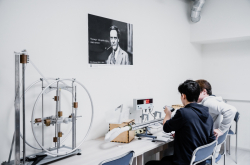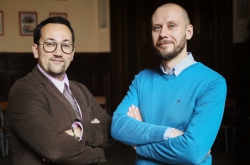A while back, scientists of NSU's science campus and startupers of the local Technopark were filmed for the Hello World documentary by the Bloomberg TV-channel. At that time, the science campus impressed the renowned journalist Ashlee Vance with its infrastructure that allows Technopark's residents to effectively promote hi-end technologies. Could you please tell us more about this infrastructure's peculiarities?
The science campus was created as a common ecosystem uniting several research institutions and the university, where it is hard to draw a distinction between the educational process and research.
Since its founding, the university has been part of the science campus and was modeled after the Moscow Institute of Physics and Technology, its main concept being that students are to get education on the basis of acting research institutions. In Soviet universities, most of the educational process took place in classrooms, and local research activities were conducted on the basis of departments or the few research laboratories. At NSU, however, only the theoretical courses were in classrooms, and everything else took place at the science center's research institutions. It was 60 years ago when Mikhail Lavrentiev, its founder, declared the simple principle which was later named the Lavrentiev Triangle: "Education, science, production". In essence, this means that it's most important to merge all these three "sides" into a common system.
The Novosibirsk's Technopark is much younger (it was founded only ten years ago), yet it is the logical continuation of the historical science center. When people ask me about the reasons behind its success, I always remember the Fakel ("torch") scientific development and production center, which we had in the 1960-s - 1970s, when no one even spoke of innovation. Most of its staff were young engineers and scientists who did research work by contract. Fakel completed more than 500 orders, and the prime costs were some ten times lower than at other development and production organizations of the USSR. In a sense, it was the forerunner of a modern Technopark.
 NSU's Technopark. Credit: medtourn.ru
NSU's Technopark. Credit: medtourn.ru
So, many of the Technopark's successful projects are the continuation of the traditions established at the time of the science campus's founding. By the time the Technopark was created, a significant number of private innovative companies that worked on serious projects were already gathered at the science campus. Those served as a basis for the Technopark's creation. I want to stress this: while it is a common thing that some first build a Technopark's infrastructure and then hope that some innovative companies would use it, our Technopark was created with regard to the existing companies' needs. This contributed greatly to the infrastructure's efficiency.
NSU is often blamed that we ascribe to ourselves the Technopark's achievements; yet, a great amount of the key staff members of its innovative companies still work and teach at our university, some are our laboratories' heads. Hence, it is often hard to tell where one's activity as a laboratory's head ends and his activities as an innovative company's employee begins, so speaking about ascribing others' achievements to ourselves is just wrong. Such concurrent service is a consequence of the close relations between our university and the Technopark.
As of now, having its own business incubator, Technopark, engineering center and the like is often seen as a measure of a university's innovative nature, yet creating a new independent Technopark at the science campus when we already have the necessary infrastructure, one of the country's best to boot, would have been just stupid. The only question we have to solve is that of proper synchronization of the university's and Technopark's actions.
Recently, much in thanks to Project 5-100, NSU has been acting as a leader and integrator in several research fields. In many areas, including the work of strategic academic units (SAU), it is the leader which unites laboratories from different universities into integration projects that may well become bases for future scientific institutions.
As many universities enter collaboration agreements in the field of innovative entrepreneurship, we may well say that university boards believe that they have to focus on working together. How does NSU choose its partners?
 At NSU Credit: nsktv.ru
At NSU Credit: nsktv.ru
Nowadays, there are many scenarios for developing entrepreneurship at universities. If there were any proven ways to achieving success, everything would have been easier. Yet, there are none - and there can be none. You can't import them from other countries, as many would've liked, because foreign universities don't have such blueprints either - only the understanding that one has to invest in innovations for some 50-60 years before attaining the same level as MIT and starting to get profits.
Each successful university chooses its unique way. If we look at what happens in many foreign universities, we'll see that only a few of them became really effective - about 10-15 percent. That speaks in favor of the absence of a common solution. What is more, the solutions have to be different for each ecosystem. We shouldn't compare NSU which focuses on fundamental science and has about 6,000 students with universities that have 20 times more students and where ties with scientific organizations and industry developed in different ways.
We follow our own development path which we chose with regard to our paradigm. Some universities are more like ours, they have similar understanding of attaining success - with those, we can collaborate. For instance, those are ITMO and the Moscow Institute of Physics and Technology, which we try to develop collaboration with. There are many universities that have a different approach, and we by no way believe it to be wrong. It's just that their approach is based on the opportunities and resources they possess.
One of the projects NSU and ITMO will collaborate on will be the conduction of the A:Start educational program on entrepreneurship which will begin in August. Please tell us more about it.
A:Start is the accelerator of the Novosibirsk Technopark "Akadempark". This is one of the country's oldest accelerators - it has been around for about seven years already. During the first acceleration sessions that we conducted several years ago, we tried bringing mentors from all over the country, St. Petersburg included. Some of ITMO's staff members already participated in A:Start's sessions. As of now, the accelerator is undergoing a few changes: we've decided to focus on accelerating science-driven, technological projects based on inventions of the Academy of Science's laboratories and our university, on projects that can contribute to NTI and the Novosibirsk region re-industrialization program. We believe it to be very important for our colleagues from ITMO to take part in it, as it can considerably increase the projects' quality.
 A:Start accelerator
A:Start accelerator
It often occurs that projects at our accelerator are somewhat outside NTU or our Technopark's competencies, but can be of interest to ITMO and vice-versa.
Thus, we aim to expand the range of experts and mentors, and promote experience exchange. It's no secret that ITMO University has great experience in conducting acceleration programs all over the country. We've made it our policy to take account of the experience of others, as focusing on one's own resources only is no good - one always needs to bring in some new blood.
In 2017, our universities plan to launch a series of programs on technological entrepreneurship, including the Startup as a Thesis concept. Can you tell us whether this approach is somewhat new to NSU and what it is actually about?
When we were drafting road maps for developing entrepreneurship at universities, we never talked about using one's startup as a thesis. For many universities, for example those who have management or innovations departments, such an approach could be appropriate. Yet, if we are talking about NSU, it is not startups but research works that are conducted by the students and are focused on solving scientific or engineering problems that hinder the completion of certain projects that we want to promote. Will those be startups, or upgrades to existing technologies, it remains to be seen. Some may believe that creating a startup is something you have to begin with. I believe that first, one has to solve the problem, and then decide on which legal form will be more appropriate for the solution. That is why when talking about NSU, we don't really use the word "startup". Our goal is in solving particular problems in fields NSU has great potential in, and giving project-oriented education to our students.
 Project defence at the A:Start accelerator Credit: social networks
Project defence at the A:Start accelerator Credit: social networks
NSU and ITMO also plan on developing innovative entrepreneurship and business projects in the field of infrastructure. What will that be about?
The common fields of science both our universities are good at are IT, quantum and medical technologies, and photonics. So, these will be the fields we will discuss cooperating in. Our collaborative efforts will include conducting guest lectures and workshops.
Why did the two universities decide to not only develop educational programs, but also launch one-time events, in their cooperation agreement?
Students from NSU mostly focus on pure fundamental science. According to the Pareto principle, from 100 physics students only 20 will become good scientists, and evidence from practice shows that that would be only around 10. So, what about the others? If we want to promote working on practical projects to our students, we have to do it during their first years as Bachelor's students. And that can only be done by having interesting lectures and meetings with specialists who themselves are an example of high-technology entrepreneurship being one of the most promising fields they can apply their talents to.
There are such specialists in both NSU and ITMO. Also, many renowned experts often come to our universities, and it would be most interesting to listen to their success stories, make use of their competencies and have them share experience with those young students who are soon to make their important choices. As of now, all we have to do so that NSU's staff and students would have access to events at ITMO University and vice-versa is to organize telecommunication properly. The more often such experience exchange will take place, the better.
 At NSU Credit: social networks
At NSU Credit: social networks
The collaboration will also include creating NTI networking centers. How will that be done?
We had many discussions in our community about how that is to be organized. We even had disputes on how they should be called. Point is, each term has its own meaning, and now we're doing something completely new and call it with an old name. And whether the name fits what we're trying to create is a whole different question. Also, there are many issues concerning which form these centers are to take. If we are talking about straight-through technologies, there are to be some centers that provide knowledge on such technologies and can provide expert advice to those who want to use them in their projects. Those technologies are something totally new, so having a network-based infrastructure is most important, as sufficient knowledge of them can't be concentrated in one place. On the current stage, we are to understand how these centers should be organized, and what would be the criteria for their efficiency. In my opinion, there should be many such centers, more than a hundred of them, because if we're talking about some competence in a particular field, it has to be narrow. When some say they want to create a common center for Big Data, which is really multi-sided, I ask: how are you planning to create a common center that will work in tens of areas that have to do with it? Big Data in pharmaceutics and Big Data in security are two different areas. The only thing they have in common is that they work with data.

Will the new collaboration affect the educational process at NSU and ITMO in any way?
As of now, we are discussing a new approach to choosing the topic for one’s thesis. There are solutions to particular tasks and problems that are highly sought after by real or potential customers. We are planning to define departments at our universities that are competent in solving such tasks; the students at these departments will be have the opportunity to choose them as their theses' topics. All the work on such theses will be conducted under the guidance of the mentors who outlined the task. The mentors are necessary so that the students won't lose sight of many practical issues during their research: their solutions must be scalable, affordable, ecological and applicable. As a result, we’ll be getting research projects that are to be defended in a classical way, but can then be used for acceleration and become new technologies, products or services.





